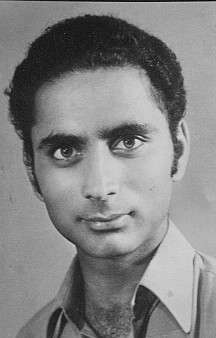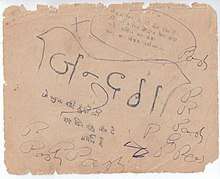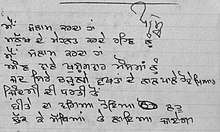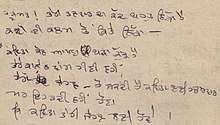Pash
Pash (9 September 1950 – 23 March 1988) was the pen name of Avtar Singh Sandhu,[1] one of the major poets of the Naxalite movement in the Punjabi literature of the 1970s. He was killed by Khalistani extremists on 23 March 1988.[2] His strongly left-wing views were reflected in his poetry.
Avtar Singh Sandhu | |
|---|---|
 | |
| Personal details | |
| Born | 9 September 1950 |
| Died | 23 March 1988 (aged 37) |
| Cause of death | Assassination |
| Citizenship | India |
| Nationality | Indian |
| Occupation | Poet/Activist |
Early life and activism
Pash was born as Avtar Singh Sandhu in 1950 in a small village called Talwandi Salem in Jalandhar district of Punjab, in a middle class farmers family. His father Sohan Singh Sandhu was a soldier in the Indian army who also composed poetry as a hobby. Pash grew up in the midst of the Naxalite movement, a revolutionary movement waged in Punjab against the landlords, industrialists, traders, etc. who control the means of production. This was in the midst of the Green revolution which had addressed India's problem of famine using high yield crops, but had also unconsciously led to other forms of inequities in Punjab.[3]
In 1970, he published his first book of revolutionary poems, Loh-Katha (Iron Tale), at the age of 18. His militant and provocative tone raised the ire of the establishment and a murder charge was brought against him. He spent nearly two years in jail, before being finally acquitted. In 1972, the 22 year old started a On acquittal, he became involved in Punjab's Maoist front, editing a literary magazine, Siarh (The Plow Line). He became a popular political figure on the left during this period, and was awarded a fellowship at the Punjabi Academy of Letters in 1985. He toured the United Kingdom and the United States the following year; while in the U.S., he became involved with the Anti-47 Front, opposing Sikh extremist violence. His words had a great influence on the minds of the people.
Assassination
In the beginning of 1988 Pash was in Punjab for the renewal of his visa from the United States.[4] A day before leaving for Delhi, however, he was gunned down by Khalistani Militants along with his friend Hans Raj on the well in his village on 23 March 1988.[5] Pash was assassinated by the Khalistanis.[6]
Literary works



- Loh-katha (Iron-Tale) (1970),
- Uddian Bazan Magar (Following The Flying Hawks) (1973),
- Saadey Samiyaan Vich (In Our Times) (1978), and
- Khilre Hoye Varkey (Scattered pages) (1989)
Khilre Hoey Varkey was posthumously published in 1989 after his death, followed by his journals and letters. A selection of his poems in Punjabi, Inkar, was published in Lahore in 1997. His poems have been translated in many languages including other Indian languages, Nepali and English. Poems written by Paarsh are popular in India, especially in Punjab and North India. Recitations of his poems are often carried out, especially on the weekends close to his death anniversary.
Sab Ton Khatarnaak
One of Pash's most popular and often cited poems is titled ਸਬ ਤੋਂ ਖ਼ਤਰਨਾਕ ਹੁੰਦਾ ਹੈ ਸੁਪਨਿਆਂ ਦਾ ਮਰ ਜਾਣਾ। सबसे ख़तरनाक होता है हमारे सपनों का मर जाना (Sabse Khatarnak hota hai hamare sapnon ka mar jaana - meaning: The most dangerous thing is the demise of our dreams).[7]
In 2005, this poem was included in NCERT's Hindi book for 11th standard.[8]
References
- Tejawanta Siṅgha Gill (1999). Pash. Sahitya Akademi. p. 1. ISBN 9788126007769.
- "Pash's father passes away in California". Hindustan Times. 25 July 2013. Archived from the original on 14 November 2013. Retrieved 7 April 2018.
- "Avtar Singh Sandhu (Pash): Life and Works of a Revolutionary Poet". Sahapedia. Retrieved 31 July 2019.
- Amrita Chaudhry (9 September 2006). "BJP's rant against Paash earns it intellectual ridicule". Indian Express. Archived from the original on 12 November 2013.
- Subramanian, Nirupama (8 October 2017). "Revolution is a Poem: Why a Punjabi poet killed by Khalistanis is ruffling feathers in contemporary India?". The Indian Express. Retrieved 12 October 2018. Pash deserves all the plaudence that can come his way. He has paved the way for revolutionaries with his poems finding spaces in protests and marches till date.
- "On Pash's birthday, remembering the fiery poet killed so young by terrorists". ThePrint. 9 September 2018. Retrieved 23 May 2020.
- Avataar Singh, Paash. "Lyrics - Sabse Khatarnak". www.amarujala.com. Retrieved 12 October 2018.
- Lal, Chaman (14 September 2017). "Why Is the RSS Afraid of the Revolutionary Punjabi Poet Pash?". The Wire. Retrieved 23 May 2020.
External links
See also
- Arjan Singh Mastana
- Baldev Singh Mann
- Chanan Singh Dhoot
- Darshan Singh Canadian
- Deepak Dhawan
- Gursharan Singh (theatre director)
- Jaimal Singh Padda
- Nidhan Singh Gudhan
- Professor Ravinder Singh Ravi
- Sarvan Singh Cheema
- Sumeet Preetlari
- Punjab insurgency